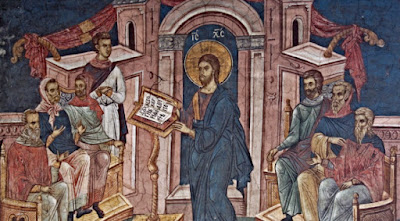So He came to Nazareth, where He had been brought up. And as His custom was, He went into the synagogue on the Sabbath day, and stood up to read. And He was handed the book of the prophet Isaiah. And when He had opened the book, He found the place where it was written:
Our Savior, after reading this prophecy through in the synagogue one day to a multitude of Jews, shut the book and said, “This day is this Scripture fulfilled in your ears.” He began his own teaching from that point. He began to preach the gospel to the poor, putting in the forefront of his blessings: “Blessed are the poor in spirit, for theirs is the kingdom of heaven.”Yes, he proclaimed forgiveness to those who were hampered by evil spirits and bound for a long time like slaves by demons. He invited all to be free and to escape from the bonds of sin, when he said, “Come to me, all you that labor, and are heavy laden, and I will refresh you.”
To the blind he gave sight, giving the power of seeing to those whose bodily vision was destroyed. He showered those in ancient times who were blind in their minds to the truth with the vision of the light of true religion. The prophecy before us shows it to be essential that Christ himself should be the originator and leader of the gospel activity. The same prophet foretells that after him his own disciples should be ministers of the same system: “How beautiful are the feet of them that bring good tidings of good things, and of those that bring good tidings of peace.”
“The Spirit of the Lord is upon Me,Then He closed the book, and gave it back to the attendant and sat down. And the eyes of all who were in the synagogue were fixed on Him. And He began to say to them, “Today this Scripture is fulfilled in your hearing.” (Luke 4:16–21)
Because He has anointed Me
To preach the gospel to the poor;
He has sent Me to heal the brokenhearted,
To proclaim liberty to the captives
And recovery of sight to the blind,
To set at liberty those who are oppressed;
To proclaim the acceptable year of the Lord.”
Our Savior, after reading this prophecy through in the synagogue one day to a multitude of Jews, shut the book and said, “This day is this Scripture fulfilled in your ears.” He began his own teaching from that point. He began to preach the gospel to the poor, putting in the forefront of his blessings: “Blessed are the poor in spirit, for theirs is the kingdom of heaven.”Yes, he proclaimed forgiveness to those who were hampered by evil spirits and bound for a long time like slaves by demons. He invited all to be free and to escape from the bonds of sin, when he said, “Come to me, all you that labor, and are heavy laden, and I will refresh you.”
To the blind he gave sight, giving the power of seeing to those whose bodily vision was destroyed. He showered those in ancient times who were blind in their minds to the truth with the vision of the light of true religion. The prophecy before us shows it to be essential that Christ himself should be the originator and leader of the gospel activity. The same prophet foretells that after him his own disciples should be ministers of the same system: “How beautiful are the feet of them that bring good tidings of good things, and of those that bring good tidings of peace.”
Eusebius, Proof of the Gospel 3.1







